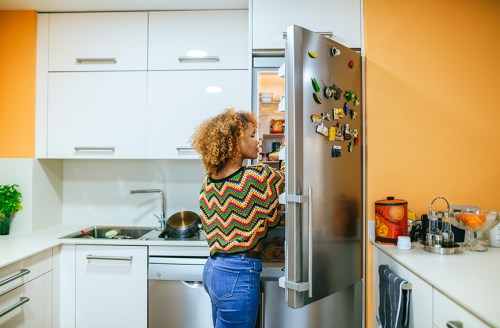Our editors independently select these products. Making a purchase through our links may earn Well+Good a commission
‘I’m a Food Scientist, and Your Refrigerator Is Too Warm—Here’s What To Do About It’
Your refrigerator is probably too warm. Here's the best temperature for a refrigerator, according to a food scientist—and how to keep it cold.

Is your refrigerator doing its job? If your groceries are spoiling too quickly, there’s a good chance your refrigerator isn’t maintaining the proper temperature. No, that doesn’t mean it’s broken. According to food scientists and dietitians, your refrigerator is probably too warm, even if the built-in thermometer says otherwise, because you’re not storing food in the right spots.
Experts in This Article
host of the Media Savvy Podcast, creator of BetterThanDieting.com, and author of food scientist and product development manager at Panaceutics registered dietitian and author of The Better Period Food Solution.
Before you toss out yet another bag of groceries, here’s everything you need to know about the proper temperature for a refrigerator—and the simple things you can do to keep it in the optimal range for freshness.
The proper temperature for a refrigerator
If your refrigerator temperature doesn’t hover around 40°F or slightly below, it’s a giant petri dish. “The reason for staying below 40°F is because most bacteria species grow best in the range of 40°F to 140°F—aka the temperature danger zone where bacteria love to grow,” says Makenzie Bryson Jackson, MS, food scientist and product development manager at Panaceutics.
Even if your refrigerator has a built-in thermometer, it’s not always 100 percent accurate. That’s why it’s smart to have backup to ensure it always stays under that limit. “I keep a thermometer within the fridge to help keep track of the internal temperature,” says Bonnie Taub-Dix, RDN, author of Read It Before You Eat It. “This tool is inexpensive and of great value.” There are a couple types to choose from, too: A standard battery-free mechanical thermometer ($7) or a digital option ($10). Experts tend to prefer the more affordable standard variety, though—it’s fuss-free and effective.
What to know about refrigerator hot spots
While your fridge stays pretty consistently cooled throughout, there are some hot spots to be aware of. According to Jackson, the main one is the door, which tends to be warmer than other areas. “Every time you open the door, the warm air rushes around it and will take longer to come back to temperature,” she says. Because of that, you might want to rethink what’s being stored there.
“Storing condiments, sodas, and juices is a good idea for the door, but not eggs, meat, or things more prone to spoilage,” she says. “I would keep keep eggs and meat in an area where the refrigerator is consistently cold, like the meat drawer or toward the back. Dairy products are also likely to spoil if it’s too warm and shouldn’t be left in the door, unless you like sour milk. An exception to this rule is butter, which is okay at higher temperatures.”
Speaking of hot spots, Taub-Dix also says to be careful to not accidentally create one yourself by putting your leftover takeout in the fridge before it’s cooled down. “Be sure to not put hot food into the fridge. This practice could raise the temperature above 40°F, causing harmful bacteria to grow in other foods that are being stored,” she says.
Here’s how a dietitian spends $30 at Whole Foods:
How overpacking your refrigerator affects the temperature
If your fridge temperature isn’t staying consistent, there could be a simple reason for that: you’re overpacking your fridge, which restricts airflow and messes with the temperature—and your refrigerator’s performance—over time.
“If a refrigerator is too full, it will restrict airflow—aka the cold air convection—making it difficult for the cold air to reach the internal part of the food mass. More surface area will put less strain on your refrigerator and help with temperature regulation,” says Jackson. “Furthermore, if the refrigerator is overpacked, internal temperature sensors may signal for it to run colder to make up for this, resulting in more cold spots and ruining some food by possibly freezing what is close to the refrigerator coils.”
When everything’s packed in there, all the groceries you stocked up on can go to waste. “This will not allow for food to be chilled consistently and therefore welcome spoilage more readily,” says Taub-Dix. “The same goes for your freezer as well.” To prevent the issue, she recommends leaving enough space between foods and not stacking things. Also, don’t overbuy. “It’s better to have an excess of shelf stable foods, where temperature is not a food safety issue.”
With these tips up your sleeve, your fridge will stay cold—and your food will stay delicious.
Here’s what a dietitian buys at Trader Joe’s:
Sign Up for Our Daily Newsletter
Get all the latest in wellness, trends, food, fitness, beauty, and more delivered right to your inbox.
Got it, you've been added to our email list.
An Island Escape Taught Me That True Balance Lives Between Quiet Moments and Bold Exploration

I’m a Digital Nomad, and This Is the Illness-Fighting Supplement I Always Travel With
Because the only thing I want to catch while traveling is a beautiful view.

These Are the Only Sandals I’d Dare to Wear on a New York Sidewalk
My go-to kicks are made for the trail, but they stand up to city grime and keep my feet cool all day.

The Island Vibes at This Ibiza Hotel Reminded Me to Prioritize Joy, Even When I’m Not Feeling It
And I'm already patiently waiting for my next trip back.

The Best Vibrators for Women






